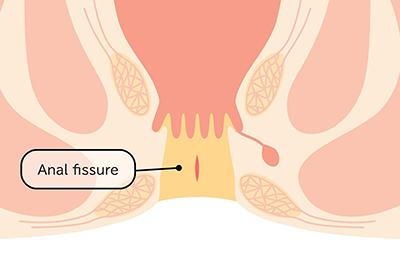What To Know about Anal Fissures

- posted: Apr. 28, 2024
If you have been experiencing pain or bleeding in the rectum, it could be due to a relatively common condition called anal fissures. This problem is prevalent in about 1.1 out of 1,000 people according to a study published by BMC Gastroenterology. Dr. Nsikak Umoh is a board certified colon and rectal specialist at Texas Colon and Pilonidal Clinic, serving patients in Cypress & The Woodlands, TX, who can help you get relief from anal fissures.
What Is An Anal Fissure?
An anal fissure is a tear in or around the anal canal that causes pain and problems with normal bowel movements. Though they are a source of major discomfort when going to the bathroom, anal fissures are distinct from hemorrhoids in that they are cuts rather than inflamed and swollen blood vessels around the anus. These fissures are usually caused by straining on the toilet due to constipation or releasing large, hardened stools. They can reoccur often if the source of the issue isn’t identified and treated.
How to Treat Anal Fissures
A tear in the anal canal can make the normal elimination of waste an extremely painful experience, cause bleeding or make it difficult to sit down comfortably. Anal fissures can be treated in one of the following ways:
- Taking a stool softener to stop constipation and allow for loose bowel movements, which gives the fissures a chance to heal.
- Topical medication (such as a calcium blocker) prescribed by your Cypress & The Woodlands, TX, colon and rectal specialist.
- Botox injections to the area, which can relax the sphincters, stimulate blood flow and promote healing.
- In persistent cases, a surgery called lateral internal sphincterotomy, to release pressure around the anal canal.
Prevention and Care
Anal fissures are mostly an issue of discomfort that can cause daily lifestyle challenges. If you think you may be prone to developing anal fissures, here are some tips for prevention and care:
- Eat a higher-fiber diet and take stool softeners regularly.
- Drink more water.
- Take regular soaks in warm bath water.
- Use a doctor-recommended ointment on the rectal area at the first sign of fissures.
Consult a Specialist About this Rectal Condition
Your rectal health is very important, as it is key to maintaining good overall digestive health. If you believe you may have anal fissures, see Dr. Nsikak Umoh, colon and rectal specialist at Texas Colon and Pilonidal Clinic in Cypress & The Woodlands, TX, for prompt treatment. Call (832) 663-0037 today to schedule a visit.

- posted: Apr. 28, 2024
If you have been experiencing pain or bleeding in the rectum, it could be due to a relatively common condition called anal fissures. This problem is prevalent in about 1.1 out of 1,000 people according to a study published by BMC Gastroenterology. Dr. Nsikak Umoh is a board certified colon and rectal specialist at Texas Colon and Pilonidal Clinic, serving patients in Cypress & The Woodlands, TX, who can help you get relief from anal fissures.
What Is An Anal Fissure?
An anal fissure is a tear in or around the anal canal that causes pain and problems with normal bowel movements. Though they are a source of major discomfort when going to the bathroom, anal fissures are distinct from hemorrhoids in that they are cuts rather than inflamed and swollen blood vessels around the anus. These fissures are usually caused by straining on the toilet due to constipation or releasing large, hardened stools. They can reoccur often if the source of the issue isn’t identified and treated.
How to Treat Anal Fissures
A tear in the anal canal can make the normal elimination of waste an extremely painful experience, cause bleeding or make it difficult to sit down comfortably. Anal fissures can be treated in one of the following ways:
- Taking a stool softener to stop constipation and allow for loose bowel movements, which gives the fissures a chance to heal.
- Topical medication (such as a calcium blocker) prescribed by your Cypress & The Woodlands, TX, colon and rectal specialist.
- Botox injections to the area, which can relax the sphincters, stimulate blood flow and promote healing.
- In persistent cases, a surgery called lateral internal sphincterotomy, to release pressure around the anal canal.
Prevention and Care
Anal fissures are mostly an issue of discomfort that can cause daily lifestyle challenges. If you think you may be prone to developing anal fissures, here are some tips for prevention and care:
- Eat a higher-fiber diet and take stool softeners regularly.
- Drink more water.
- Take regular soaks in warm bath water.
- Use a doctor-recommended ointment on the rectal area at the first sign of fissures.
Consult a Specialist About this Rectal Condition
Your rectal health is very important, as it is key to maintaining good overall digestive health. If you believe you may have anal fissures, see Dr. Nsikak Umoh, colon and rectal specialist at Texas Colon and Pilonidal Clinic in Cypress & The Woodlands, TX, for prompt treatment. Call (832) 663-0037 today to schedule a visit.
The Woodlands Location
920 Medical Plaza Drive Suite 330,
The Woodlands, TX 77380
Cypress Location
27700 Northwest Freeway Suite 330,
Cypress, TX 77433
Our Regular Schedule
Texas Colon and Pilonidal Clinic
Monday
8:00 am - 5:00 pm
Tuesday
8:00 am - 5:00 pm
Wednesday
8:00 am - 5:00 pm
Thursday
8:00 am - 5:00 pm
Friday
8:00 am - 5:00 pm
Saturday
Closed
Sunday
Closed

